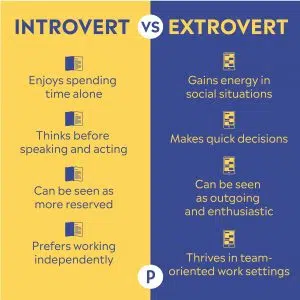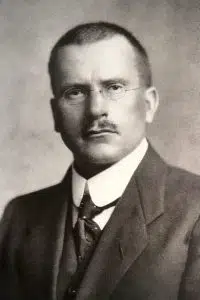How would you describe yourself? A question you may have an answer to right away, or maybe you have to think about it for a while before making a decision.
 Are you the kind of person who thrives off collaboration? Would you say you’re outgoing, maybe even the life of the party? These traits would belong to someone who is extroverted.
Are you the kind of person who thrives off collaboration? Would you say you’re outgoing, maybe even the life of the party? These traits would belong to someone who is extroverted.
Someone on the opposite side of the spectrum would be defined as introverted. A person who enjoys time alone, can be boring, and sometimes seems like they can lack motivation.
The History
 The definitions above are more parallel with how the majority of modern society interpret the words “introvert” and “extrovert” compared to how they were introduced by Carl Jung back in 1921.
The definitions above are more parallel with how the majority of modern society interpret the words “introvert” and “extrovert” compared to how they were introduced by Carl Jung back in 1921.
Jung was a swiss psychiatrist who heavily influenced the fields of psychiatry, anthropology, literature, and philosophy from the early 1900’s up until his death in 1961.
He defined introverts as people who are more comfortable with their inner thoughts and feelings, so they see the world in terms of how it affects them.
On the flip side, Jung describes extroversion as individuals who enjoying being part of places where they get the chance to interact, and are actively aware of the world around them.
An important note Jung made was that none of us are completely introverted or extroverted, but we feel connected to one side or the other.
Are introverted and extroverted traits valued equally?
No matter what your personal traits are, they affect you in every avenue of your life. In this four-part series I would like to determine if extroversion is beneficial in someone’s personal, professional, and social life.
In professional settings such as schools and the workplace, extroversion on the surface seem to be highly encouraged. Western culture is engraved with beliefs and ideologies that success comes from well-spoken, charismatic people.
When it comes to any kind of personal relationships, the combination of personality traits between the two people is significant. An extrovert-introvert relationship can be very difficult to manage, but like any relationship balance is one of the keys to happiness.
Being way to far left or way to far right on the “personality scale” may have you missing, or blowing opportunities you want to take in life. So, having a healthy balance that satisfies you is most important.
However, this is defiantly not as easy as you think.
Susan Cain
Susan Cain is currently an American writer lecturer, and author of the 2012 non-fiction Quiet: The Power of Introverts in a World That Wont Stop Talking. Cain is also a former lawyer and negotiations consultant who earned her Juris Doctor degree from Harvard University.
Her book was fuelled with passion and indignation stemming from difficulties she has faced as an introvert. In her experience, she felt she was made to do things that didn’t maximize her own potential.
Cain also co-authored Quiet: The Secret Strength of Introverts, focused on introverted children, teen’s, and to educate the parents.
She used these experiences and began doing TED talks to share her ideas even further. In 2015, Cain co-founded Quiet Revolution, a mission-based company with initiatives in the areas of children (parenting and education), lifestyle, and the workplace.
“There is no such thing as a pure introvert or extrovert.”
-Carl Jung#RethinkQuiet pic.twitter.com/lGTfpLj1DT— Quiet Revolution (@livequiet) March 13, 2018
When she began publicly selling her stories and ideas, it was time for her to bring out her “extroverted” side.
When it comes to business, tapping into both sides can be extremely beneficial. Cain describes the seven years of researching, thinking, and writing her book as “total bliss”, but when it was ready to launch, she was petrified.
No matter the personal qualities you have, no one is perfect. which means you can always work on bettering yourself.
Coming Febuary 5th– Part 2: Professional Life
Coming Febuary 7th– Part 3: Personal Life
Coming Febuary 9th– Part 4: Social Life

